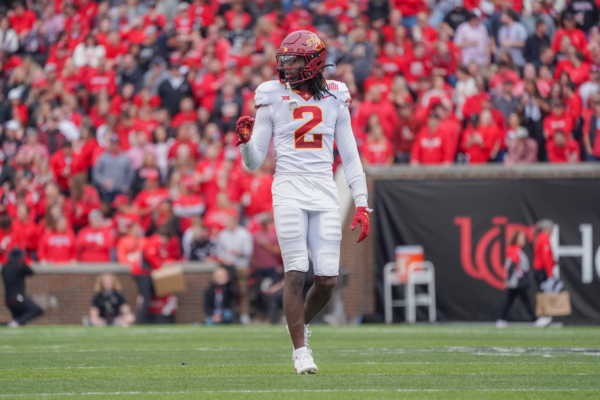Big 12 Series: Golf teams likely won’t see much change
Illustration: Ryan Francois/Iowa State Daily
While some sports are affected by the conference realignment in the Big 12, golf does not expect to see many changes. The ISU golf teams face opponents from different conferences throughout the season, and each team’s biggest conference event is the Big 12 Championships.
April 10, 2012
Conference realignment for the Big 12 has caused shock waves among the sports that are affected by teams both coming and going.
One sport the realignment hardly has any effect on, however, is golf.
“I wouldn’t say it directly affects us,” said ISU men’s golf coach Andrew Tank. “The only time we play against Big 12 competition is at the Big 12 Championship.”
Iowa State’s women’s golf coach Christie Martens shared the same view as Tank: The change will not be a significant one.
Golf is set up differently than almost any other Division I sport. Instead of head-to-head matches throughout the season, each team participates in invitational meets with several other schools.
The teams participating aren’t just from the Big 12, either. Instead, the schools can range from a small Division III school to a full-fledged Division I school.
Then, at the end of each year, every team in the conference gathers for a championship meet. For the men’s golf teams in the Big 12 Conference, it rotates between two sites: Prairie Dunes in Hutchinson, Kan., and Whispering Pines in Trinity, Texas.
This year for the men’s Big 12 Championships, the teams are competing at Whispering Pines.
“For us, the conference championship is kind of a special event at the end of the year, and being the fact that it’s the only time where all the schools are there, I think that’s kind of a cool part of it,” Tank said.
The women’s Big 12 Championships, however, fluctuates year-to-year and will take place in Lawrence, Kan., this year for the second time ever.
Leaving the conference after this season is Texas A&M and Missouri.
Texas A&M’s men’s team won the 2009 national title and is currently ranked No. 14, according to Golfweek.com, while the women are No. 17.
The A&M men are traditionally near the top of the college rankings every year. This year, they boast four golfers in the top 100, including No. 43 Cameron Peck.
Comparatively, Missouri is not as strong of a golf program with its men ranked No. 79 and women ranked No. 94. Its top-ranked golfer is No. 69 Jace Long on the men’s side, and Hannah Lovelock is No. 404 on the women’s side.
From a strength perspective, the Big 12 will lose one team, but not necessarily strength as a conference.
With Missouri and Texas A&M leaving, only Texas Christian University will join.
West Virginia doesn’t have a golf program for men or women. However, WVU Sports Information Director Bryan Messerly said in an email to the Daily that the school is “reviewing the possibilities of adding additional sports in the near future to better integrate itself into the Big 12 Conference. No decision has been made for what sport and when that will be.”
Martens said she doesn’t believe losing the two teams and adding TCU will have much of an effect on the conference.
“I don’t think there’s a huge difference between Texas A&M and TCU from a women’s golf standpoint,” Martens said. “They’re both pretty similar in their history.”
TCU brings in the No. 34-ranked men’s team and also the No. 35-ranked women’s team. On the men’s side, TCU boasts the No. 14-ranked golfer in college golf in Julien Brun, along with the No. 69-ranked golfer in Johan De Beer.
“Texas A&M leaving definitely weakens the conference from a golf standpoint,” Tank said. “They won the NCAA Championship a couple years ago. They’re usually a top 15 program, so that definitely weakens the overall strength of the conference, but TCU is a good addition.”
Even though the golf programs ultimately won’t be affected heavily by the conference changes, that doesn’t mean they weren’t worried when it was happening earlier in the year.
“There’s always fear involved when you don’t know the future and you don’t really have much control in it either,” Tank said. “Luckily, our leadership and [ISU Athletic Director] Jamie Pollard were on top of things and they worked out.”
There’s been a lot of concern and change with the Big 12 realignment, but amid the exodus, Big 12 golf has no reason to worry.
“We don’t have a series where we go and play every school at their place, so it’s not going to be really different,” Martens said. “I’m not anticipating a huge effect.”

















